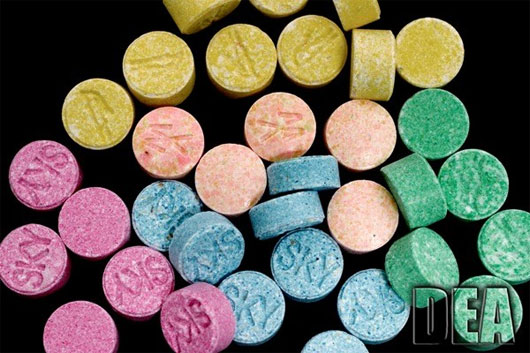New discovery of the 'horrifying hallucination' of ecstasy
London scientists have made a new study of the effect on the brain of ecstasy.
Recently, the Royal University of London (UK) has published the results of research on ecstasy (pink blade) - scientific name is MDMA, in the treatment of post-traumatic stress disorder, also known as seizure syndrome. psychological compassion.
Pink blade began to be used as a stimulant from the 1980s of the last century. It is a strong stimulant synthetic drug on the central brain, causing hallucinations, anxiety, hangover .
So far, there has been almost no overall study of the effects it can cause. Therefore, according to scientists, the new study using this magnetic resonance imaging (MRI) method is of great importance.

Ecstasy (pink blade) is a widely used stimulant for more than 30 years
To test the effect of persimmons on the brain, 25 volunteers who participated in this study had a brain scan after using the ecstasy and once after using a placebo (with the y shape and taste). like ecstasy, but not working).
The results showed that ecstasy inhibits activity in the brain edge - the part that determines the emotional response of people. This relationship is evident in signs of inhibition that occur more with people who have experienced strong emotions. The connection between the medial temporal lobes and the prefrontal cortex to control emotions also decreased. This will partly help depressed patients to experience constant insecurity.
When used, ecstasy increases communication between the amygdala and the hippocampus in the brain. After using erythrocytes (not placebo), volunteers rated the "hallucinations" more vividly and happily. As for unhappy memories, they also rated less negative.
This shows that the red blade has influenced the part of the brain that governs emotions and memory - creating a strong "hallucination" .

Magnetic resonance imaging shows a decrease in blood flow in the visual cortex and the brain margin
Dr. Robin Carhart-Harris, who is in charge of research, said: "Red blade (MDMA) reduces blood flow in areas of the brain that affect emotions and memory, causing users to be excited and excited. like after using medicine '.
Some scientists argue that the results of the use of red blanches in the treatment of anxiety and post-traumatic disorders are uncertain, because it is only being tested in healthy people. Experts will continue to verify the true effects of persimmon on patients to get the most accurate conclusion.
However, the scientists warn, even though the study offers a few small benefits of reddish bile to people with psychological trauma but the harms and dangers that ecstasy users will have to deal with. the face is much bigger.
- 'Relay' noise music for ecstasy
- Octopus drinking ecstasy has a human-like reaction
- Ecstasy causes destruction of brain cells
- A small amount of ecstasy is also harmful to the brain
- The pigeon transports 200 ecstasy pills
- The most horrifying fires in human history
- New discovery about 'virtual smell'
- The most horrifying volcanic eruptions in 2010
- Vanga's horrifying prophecy in 2016 is based
- Video: The horrifying prospect of Paris' apocalypse
- Tsunami of tsunami in Japan
- 20 somewhat horrifying truths related to the human body
 Green tea cleans teeth better than mouthwash?
Green tea cleans teeth better than mouthwash? Death kiss: This is why you should not let anyone kiss your baby's lips
Death kiss: This is why you should not let anyone kiss your baby's lips What is salmonellosis?
What is salmonellosis? Caution should be exercised when using aloe vera through eating and drinking
Caution should be exercised when using aloe vera through eating and drinking